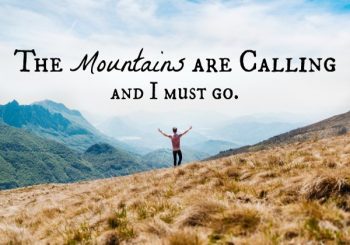 By Nikki Harper
By Nikki Harper
Staff Writer for Wake Up World
How many times have you noticed that your mood improves when you’re outdoors, surrounded by nature? How often have you wrestled with a difficult issue, only to find that the pieces seem to fall into place while you’re taking a walk or sitting on a beach? Many of us instinctively know, and can back up from experience, that being out in nature is good for our mental health. As awareness grows of the need for holistic health solutions, it seems that the medical and scientific establishments are also catching up with what we’ve known all of our lives: interaction with the natural world is good for you.
[pro_ad_display_adzone id=”110028″]
A recent study at Cornell University, for example, has found that as little as ten minutes exposure to the natural environment can lower stress levels in students [1]. This research, published in Frontiers in Psychology, reviewed previous research into the effect of nature on people aged between 15 and 30, with an aim of discovering what ‘dosage’ of natural environment is necessary for health benefits to be observed.
This is important, because it’s all too easy to tell someone to ‘go outdoors for a bit’. As a solution to a long term health issue, this is not helpful. Finding a ‘dosage’ can give people a tangible goal and something to work towards if they are trying to incorporate the natural world into their healing.
Cornell found that between 10 and 50 minutes of outdoors time appears to be the optimal level for improving mood and focus, and lowering heart rate and blood pressure. Beyond 50 minutes, the effects tended to plateau [1].
This research has implications for the growing trend towards ecotherapy as a way of treating mental health issues.
Ecotherapy is a term which could cover any number of things, from wilderness retreats of several weeks or even months, to a quick stroll in the park during your lunch break at work. It incorporates things like green exercise initiatives, art therapy outdoors, horticultural therapy, and some kinds of animal assisted therapy. There are no end of inventive ways in which we can use the natural environment to contribute to our wellness.
Here in the UK, a GP surgery in Manchester has recently begun to prescribe gardening and plant care for people with depression or anxiety [2]; indeed, horticultural therapy is increasingly popular, not least because it combines nature contact with physical exercise and social interaction [3].
Ecotherapy treatments of one kind or another fit in with the current trend towards what is known as social prescribing – this is where linkworkers direct patients to a wide variety of non-clinical activities such as gardening, social clubs, cookery classes, sports, the arts and so on, typically provided by the voluntary sector and or within the community. Social prescribing aims to combat all kinds of mental health issues, social isolation and lack of exercise. It has been known for some time now that a person’s social circumstances can have an even bigger effect on their health than their level of healthcare [4], so the concept of social prescribing makes a great deal of sense. Indeed, one report from the British Medical Journal notes that:
Tackling complex and long-term health problems requires an extensive holistic approach not possible in routine primary care. This model of social prescribing, which takes into account physical and mental health, and social and economic issues, was successful for patients who engaged with the service [5].
Britain’s NHS is investing heavily in the infrastructure necessary for social prescribing, more so than any other national health service, and estimates that more than 900,000 people will have been referred to social prescribing by 2023/24 [6]. Indeed, 59% of British GPs believe that social prescribing will lessen their workloads and bring benefits to people with long term health conditions [7].
Ecotherapy programs, interventions and activities are likely to play a growing role both in social prescribing and in people’s efforts to find their own self-help solutions to mental health issues and long term conditions.
A review of ecotherapy studies from 2018 noted that
Clear and abundant evidence demonstrates that interaction with nature affects not only well-being but health throughout life [8].
Urban planners are starting to take note of the need for green spaces in our built environments, which is heartening. As evidence mounts that as little as ten minutes a day in your garden or yard or in a nearby park can boost your wellness, it is to be hoped that the message gets across loud and clear to all of us. It looks like all those mums who were forever telling us to go outside and play may have had a point after all.
Article sources:
- [1] https://www.frontiersin.org/articles/10.3389/fpsyg.2019.02942/full
- [2] https://www.manchestereveningnews.co.uk/news/greater-manchester-news/plants-herbs-gp-surgery-hulme-16814037
- [3] https://www.theguardian.com/lifeandstyle/shortcuts/2019/aug/26/ecotherapy-plants-treatment-depression-anxiety
- [4] https://journals.sagepub.com/doi/10.1177/00333549141291S206
- [5] https://bmjopen.bmj.com/content/7/7/e015203
- [6] https://www.england.nhs.uk/personalisedcare/social-prescribing/
- [7] https://www.rcgp.org.uk/about-us/news/2018/may/rcgp-calls-on-government-to-facilitate-social-prescribing-for-all-practices.aspx
- [8] https://www.ncbi.nlm.nih.gov/pmc/articles/PMC6085576/
Recommended articles by Nikki Harper:
- Harnessing the Power of Synchronicity
- Beyond 11:11 – The Significance of Repeating Number Patterns
- A Time to be Born and a Time to Die: Can Astrology Predict Death?
- Premature and Caesarean Birth: An Astrological Misinheritance?
- The Benefits of a Daily Divination Practice – and How to Start One
- 7 Ways to Find Awe in Your Everyday Life
- Need Answers? Looking for Insight? 7 Ways Astrology Can Help
- Alone But Not Lonely: 6 Amazing Benefits of Solitude
- Dancing in the Rain: 6 Reasons We Should All Be Pluviophiles
- Finding Time for a Daily Spiritual Practice – How and Why to Devote Your Time
- 7 Simple Steps to Start Communicating With Nature
- Getting Started with Remote Viewing: Step by Step to Strengthen Your Psi Abilities
About the author:
 Nikki Harper is a spiritualist writer, astrologer, and editor for Wake Up World. She writes about divination, astrology, mediumship and spirituality at Questionology: Astrology and Divination For the Modern World where you can also find out more about her work as a freelance astrologer and her mind-body-spirit writing and editing services. Nikki also runs a spiritualist centre in North Lincs, UK, hosting weekly mediumship demonstrations and a wide range of spiritual development courses and workshops.
Nikki Harper is a spiritualist writer, astrologer, and editor for Wake Up World. She writes about divination, astrology, mediumship and spirituality at Questionology: Astrology and Divination For the Modern World where you can also find out more about her work as a freelance astrologer and her mind-body-spirit writing and editing services. Nikki also runs a spiritualist centre in North Lincs, UK, hosting weekly mediumship demonstrations and a wide range of spiritual development courses and workshops.
Say hi at Questionology.co.uk or on Facebook.
[pro_ad_display_adzone id=”110027]






